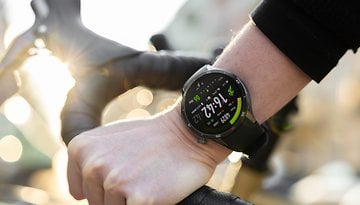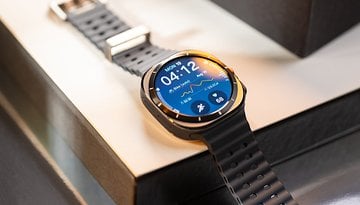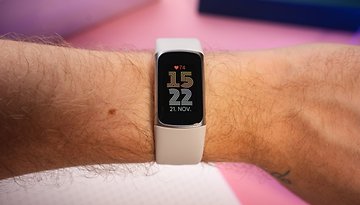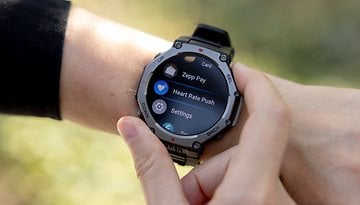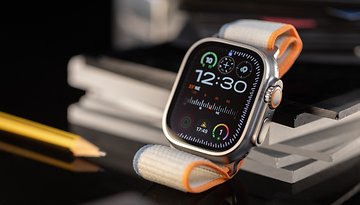Xiaomi Smart Band 8 Pro Review: Affordable Performance
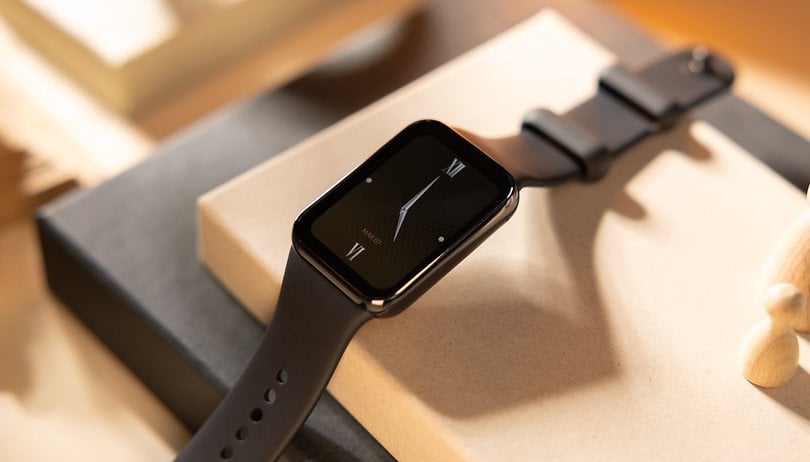

A brand new year, and the world gets a new Xiaomi fitness tracker. We are now looking at the 8th iteration of the Xiaomi Smart Band, aptly named the Xiaomi Smart Band 8 Pro. The new model sports a larger display at a lower price. Find out what else has changed since the Xiaomi Smart Band 7 Pro (review) and what the new fitness tracker from Xiaomi has to offer in general in this review.
Good
- Very fair price
- Attractive design
- Large display
- GPS/GNSS
- Decent battery life
Bad
- Too little innovation
- No NFC
- AOD drains a lot of battery
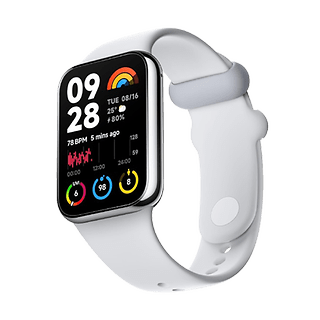
The Xiaomi Smart Band 8 Pro in a nutshell
The Xiaomi Smart Band 8 Pro finally has a strong selling point—its price. People who purchased the Smart Band 7 Pro in 2022 are most likely going to be annoyed as the new fitness tracker offers pretty much the same features, albeit with an increased display size at 1.74 inches and at a $79 price point. Do bear in mind Xiaomi's products are not officially available in the US, although you can pick it up at that price point via online retailers such as Amazon.
Surprisingly, we still have to live without NFC outside of China, where nothing much has changed in terms of functionality since last year. The watch is well-made and looks really stylish for a fitness tracker. If you can live with the fact that the battery dies after approximately six days with the Always-On Display activated and how you are unable to perform cashless payments using the fitness tracker, you'll get a device with a good price-to-performance ratio.
The fitness tracker is available in black or gray shades with other options for the wristbands. Remember, you will only find a charging cable in the box without any charger.
Design and display
Visually, the Smart Band 8 Pro is closer to a smartwatch than a fitness tracker. The AMOLED display, which has grown to 1.74 inches, makes it even easier to read than the rest of Xiaomi's fitness tracker range.
Pros:
- High-quality workmanship.
- Large display.
- 5ATM water resistance.
- Attractive design.
- Infinitely adjustable brightness.
Cons:
- Clasp does run into issues.
- Always-on Display consumes plenty of battery power.
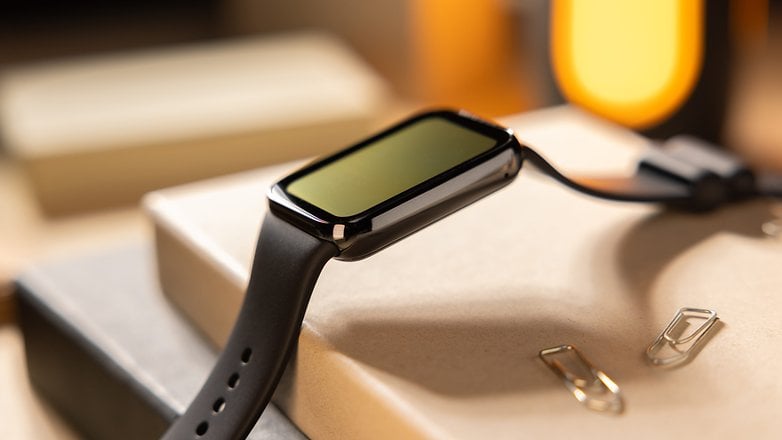
I like the design just as much as its predecessor, except that the display has now grown to 1.74 inches. Apart from that, it looks exactly like its predecessor. This is not negative at all, as it is visually appealing with a mix of Gorilla Glass Victus and a polymer fiber case. There are exactly zero buttons, crowns, or other physical input methods for this well-made device as everything is controlled via the touchscreen. This gives the device an almost elegant simplicity.
The TPU wristband is easy to attach and just as easy to remove if you want to replace it with another one. However, I found the clasp to be a little fiddly, although this could also be due to my rather clumsy fingers. If you prefer, you can get a replacement strap, including alternatives that rely on braided nylon or calfskin.
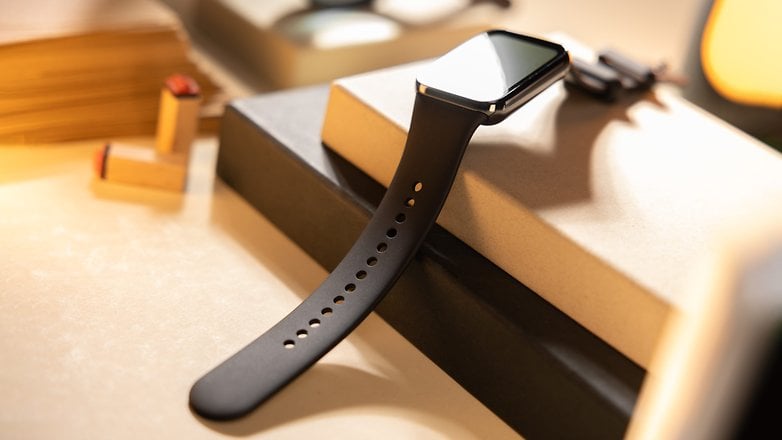
Xiaomi promises us 5ATM water resistance. I know—I'm also waterproof up to 5 bar (forgive my bad jokes! If it's in my head, I have to write it!). Incidentally, if you're swimming or showering, you're better off with a watch that is water-resistant up to 10ATM. However, washing your hands or walking in the rain is not an issue at all with the Smart Band 8 Pro.
The marketing department at Xiaomi is certainly doing its best in terms of technicalities, citing the fitness tracker as featherweight light at 22.5 g and measuring a mere 9.99 mm thin. The strap is not included in the weight and Xiaomi generously omitted the heart rate sensor from the thickness to remain under the 1 cm limit. I realized this is common practice among fitness tracker manufacturers, but nobody would let me get away with it if I said that I weighed a snug 89 kg if I left out the belly.
The Xiaomi Smart Band 8 Pro display
Three or four quick thoughts about the display: the resolution (336 x 480 px) and pixel density (336 ppi) have increased with the larger screen size. You get a 60 Hz refresh rate and a 600 nits brightness, both of which are already present in the Xiaomi Smart Band 8 (review). The brightness level, which can be adjusted both automatically and manually (finally!) is not the highest, but you can still read the fine AMOLED panel clearly at all times, even when outdoors.
Incidentally, the Always-on Display is also very easy to read. We discuss what AOD does to the battery under the 'Battery' section later.
In general, the larger display makes everything a little easier to read and I think Xiaomi has made a nice compromise here: large enough to read everything easily and small enough that women with smaller wrists should also feel comfortable wearing this fitness tracker.
Software and operation
As with its predecessor, Xiaomi also dispensed with a physical control element on the Smart Band 8 Pro. All input will have to be performed via the touchscreen.
Pros:
- Self-explanatory user interface.
- App chaos has been eliminated.
Cons:
- Too many menu levels to arrive at the desired sport/activity mode.
- No NFC/mobile payment support.
- Vibration motor is too powerful.
Nothing much has changed in terms of operation: There are no buttons and crown with which you can scroll or select menu items. Everything is performed via the touchscreen. That's all right, really, because the operation is almost foolproof. If you have used Xiaomi watches/trackers before, you will know how to use it right from the get go. If not, you'll have it down in no time: swipe up to access the app overview, swipe down for the notifications, and swipe left or right through your widgets and into the quick settings.
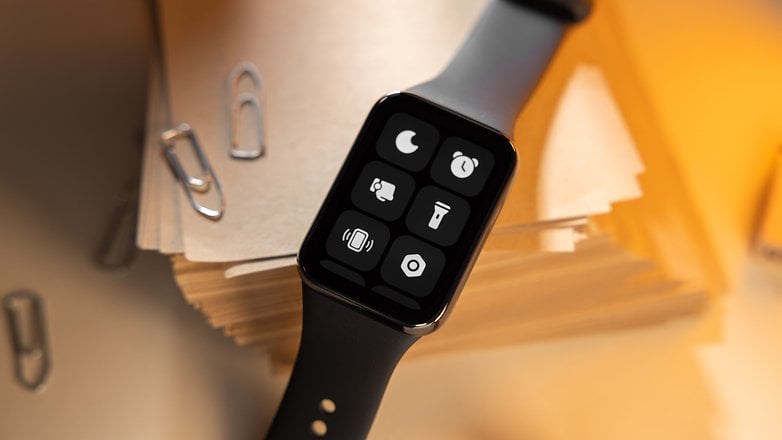
You will also have the option of placing several of these widgets on one screen and in different sizes. To edit the widgets and screens, you use the Mi Fitness app, which incidentally looks almost exactly the same as when I reviewed the Smart Band 7 Pro around a year and a half ago. This translates to uniformity, continuity, but it may also mean that there simply hasn't been much development.
The app is available for both Apple and Android and requires you to have a device running at least iOS 12 or Android 8.
You know, I'm a lazy person and am far from really immersing myself in any kind of sporting activity. That's why this app is almost perfect for me. I get statistics on my heart rate, sleep quality, blood sugar level, and I can track my completed laps and much more. I'm totally happy with that. If I want to pair the device with the app, it's easy, as is loading/changing the watch faces and customizing my profile.
If you are more demanding, you should take a look at the competition, including Fitbit, or check the Withings ScanWatch 2 (review) out. Although the latter is not explicitly labeled as a fitness tracker, it offers very comprehensive health features, especially with the subscription service.
What else did I miss? Oh yes, the vibration motor gets on my nerves again this time. I would have liked to be able to adjust the intensity level. Personally, I'm pleased that Xiaomi seems to have got the app chaos under control. You are also prominently informed in the Mi Fitness app that you can transfer all your data from Zepp Life to Mi Fitness.
Apart from that, I have the feeling that Xiaomi should slowly include a few smart features here and there. Yes, you can control your music in a rudimentary manner, receive notifications and the weather display, but that's about it. There aren't enough apps for me and, unlike the Chinese version, there's no NFC and therefore, no cashless payment. Please step it up a notch, Xiaomi!
Fitness and health functions
Xiaomi offers over 150 sports modes with the Smart Band 8 Pro, some of them even featuring a "3D trainer" for warming up, interval training, and all the bells and whistles. Functionally, however, not much has changed. I believe that some measurements such as sleep tracking have become much more accurate.
Pros:
- Over 150 sports modes supported.
- More precise sleep tracking.
- AI pacer and "3D trainer" for warming up for selected sports.
- Can be used without a smartphone thanks to GNSS and GPS.
Cons:
- What's wrong with the "stand up" function?
- Very little change compared to its predecessors.
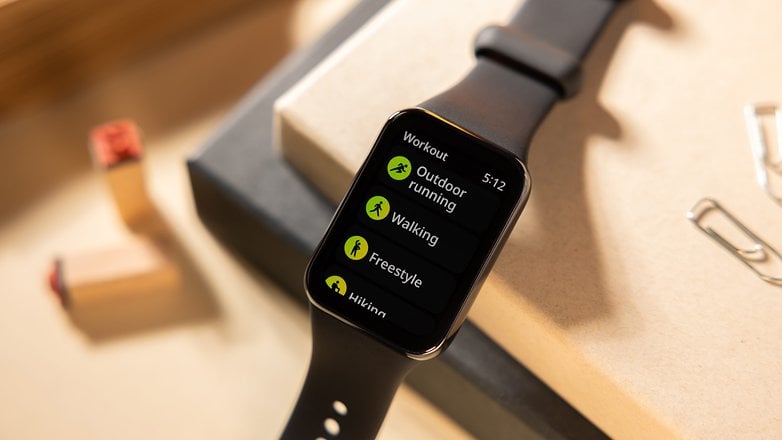
Honestly? I have some beef with Xiaomi in this section. For instance, I have a problem with how Xiaomi's fitness trackers sometimes differ ever so slightly from device to device. Should I now praise GNSS/GPS effusively, even though it was already available on the Xiaomi Smart Band 7 Pro, or philosophize about an astonishing 150 sports modes that we already know of in the basic model, the Smart Band 8?
Do I need to explain the heart rate and SpO2 sensors, which we also know are present in previous models? These days, the health functions of fitness trackers are just as important and comprehensive as the fitness functions, so these sensors naturally play an important role. However, it is also about precision. No tracker or smartwatch (not even an Apple Watch) can replace a doctor. This means the displayed heart rate, measured deep sleep phase, or pre-calculated menstrual cycle are only guidelines. This leaves us somewhere between a medically accurate measurement and a guesstimate at all times.
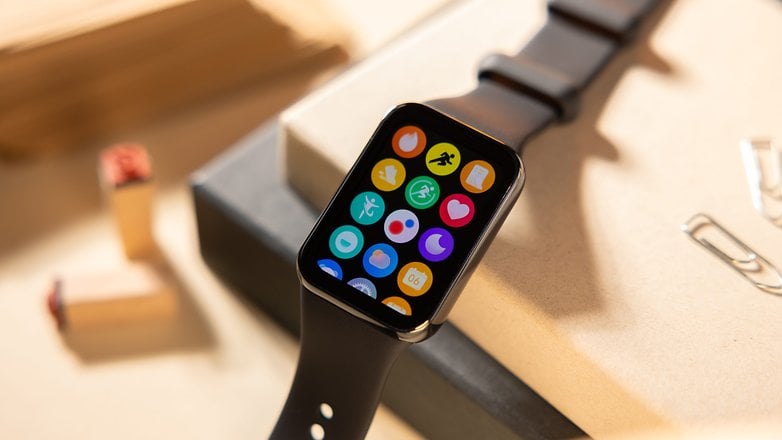
Of course, the manufacturers know this as well, so it's good form to explain with every new model that function XY now measures even more accurately than before. For example, Xiaomi lets us know that we can measure the heart rate ten percent more accurately and that the precision in measuring oxygen saturation has also increased by five percent. This brings me to another problem: I don't have the technical means to verify this using such measurements.
For me, recording all the values—pulse, oxygen saturation, stress level, or even the vitality score, works very well in this sense: Yep, it sounds realistic. Before you make your purchase decision, don't expect me to tell you that, for instance, your heart rate will be displayed just as reliably as on a high-priced fitness tracker with a chest strap.
What I do know how to do and do well is this: sleep! I can lie awake without sleeping, nap for a super long time, and everything in between. I've sometimes struggled with fitness trackers, including those from Xiaomi, because they just didn't work for me. In this case, however, my sleep was actually tracked carefully and differentiated between light sleep, deep sleep, the REM phase, and even my 'waking up and going to the toilet several times' action which escape the attention of my smart companion.
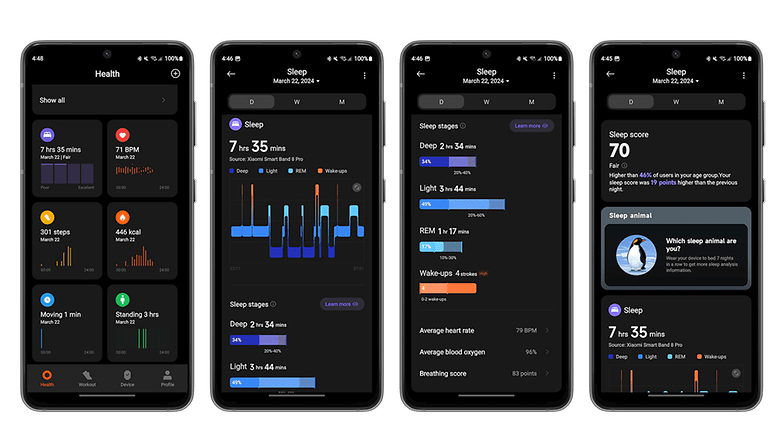
Do be aware the Smart Band 8 Pro keeps offering features and measurement options that you have to manually activate. For instance, automatic pauses while running, permanent tracking of oxygen saturation, and also the recording of REM phases. Please remember this before you complain to Xiaomi that some promised function is not measured at all.
What is new but just a gimmick for me is the "3D trainer". This feature prepares you for your exercises via a few sports with warm-up exercises. You can find this for running, for example, by going to the settings for the relevant sport. There you will also find the AI Pacer, which sets the pace and motivates you to perform better.
As someone who reviews consumer electronics, I would be happy if Xiaomi offered me more innovation and new or improved features. As an eternal couch potato who at best walks a few laps, the range of functions is, of course, absolutely sufficient for me.
p.s. Xiaomi, what's going on with your "get up" feature? I've set it to remind me to get up when I've been sitting on my butt for an hour. That doesn't work at all. Sometimes I've heaved myself up to the third floor of my new residence, only to be asked to get up two minutes later. Sometimes the reminder even notifies me while I'm standing.
Battery life
The battery capacity has grown to 289 mAh but fluctuates depending on use. Unfortunately, Xiaomi still doesn't support wireless charging nor include a charger in the packaging.
Pros:
- Absolutely sufficient battery life.
Cons:
- No wireless charging supported.
- Short charging cable.
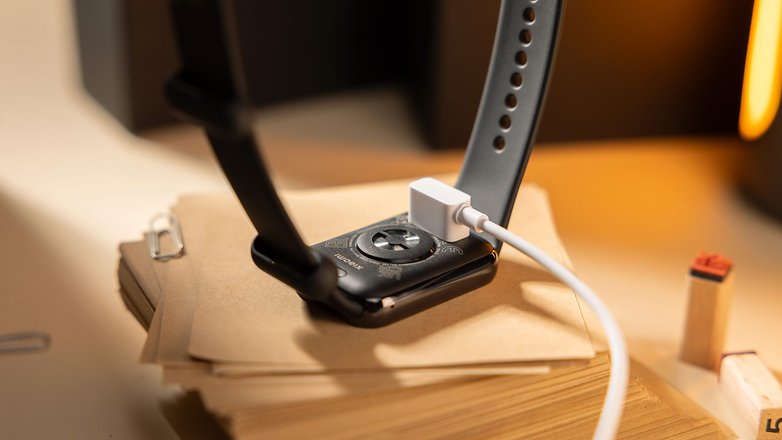
Not much has changed since its predecessor launched. This applies to the charging cable, which is once again too short for me, to the lack of a charger, and even more so, the lack of wireless charging support. However, I imagine the battery life has improved compared to the Smart Band 7 Pro.
Once again, I've simply switched on everything that can be activated in terms of functions, have everything measured, all notifications pop up, and wore the tracker 24/7, making sure I am constantly connected to my smartphone via Bluetooth. As the icing on the cake, the Always-on Display was also active all the way. By doing so, I obtained approximately six days from this battery before I had to look for a power socket again.
Sure, that's significantly less than the predicted 14 days. But if you don't enable everything, do not measure your blood oxygen level constantly, and disable AOD, I think the stated battery life is actually achievable. Thumbs up for the battery life.
Technical specifications
| Technical specifications | |
|---|---|
| Device | |
| Image |
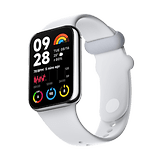
|
| Display | 1.74 inch AMOLED 336 x 480 px (336 ppi) 60 Hz refresh rate max. 600 nits Gorilla Glass Victus |
| Dimensions | 46 x 33.35 x 9.99 mm (without heart rate sensor) |
| Weight | 22.5 g (without wristband) |
| Colors | Black, Light Gray |
| Battery capacity | 289 mAh Fast charging support Charging cable included, mains adapter not |
| Protection | 5 ATM |
| Connectivity | Bluetooth BLE 5.3 |
| Sensors | Accelerometer Gyroscope Optical heart rate sensor and pulse oximeter Ambient light sensor |
| Other features | Compatible with Android 8.0 (or higher) iOS 12.0 (or higher) more than 150 sport modes |
Conclusion
Honestly? After the first one or two days of reviewing the device, I was actually in a bit of a bad mood and was already considering whether I should choose something like "Xiaomi—we put the pro in problematic" as the headline for my review. The reason? I simply miss notable improvements. Everything that was good about the predecessor is still good here. There are plenty of sports modes to choose from, it looks good, has a nice display, is intuitive to use, has GPS/GNSS, and you can't complain about the battery either.
On the flip side, the lack of wireless charging and NFC support continue to remain, and Xiaomi doesn't unleash slew of new features. What's more, the release was too late for me: we're getting a brand new product that was launched in China last August. I was wondering whether I should give it 3 or 3.5 stars and write a grumpy review.
However, taking a look at the price tag proved me wrong. The Smart Band 8 Pro costs just $79. This allows me to rate it four stars with a clear conscience, even if I still wish Xiaomi would at least give me NFC in the next generation! It can't be that difficult, damn it!







